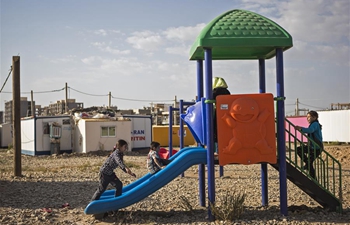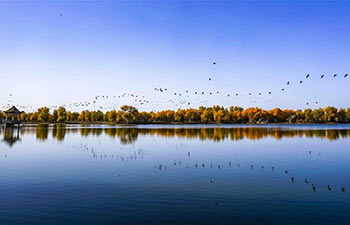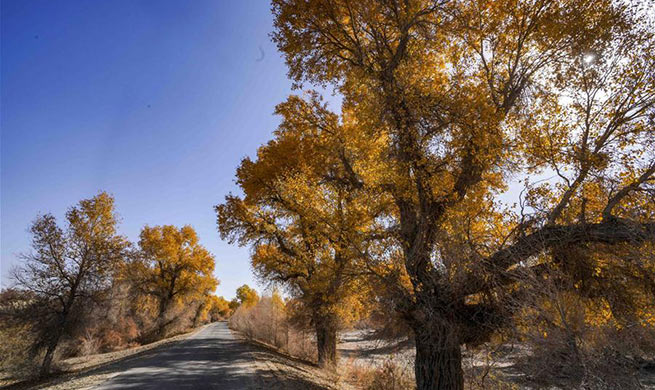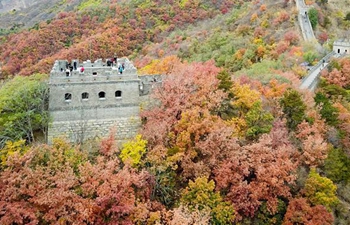YINCHUAN, Oct. 30 (Xinhua) -- When Chen Zibiao was young, his hometown was always experiencing ferocious winds, which blew sand from the nearby desert all over the locality.
"The sand would pile up along the houses, and children would jump from the dunes to the rooftops," Chen recalled.
Chen, 40, is a resident of Erdaohu Village in Yanchi County, in northwest China's Ningxia Hui Autonomous Region. The county was once poverty-stricken due to desertification. But after years of efforts, the environment there has been restored, and the county has also shaken off poverty.
Last month, Yanchi became the first of nine counties in Ningxia's Xihaigu, an area known for its poor living conditions, to get out of poverty.
But the success did not come easy.
In the 1980s, Yanchi, located close to the Maowusu desert, had a poor ecological system. Prolonged drought and overgrazing caused 75 percent of its population to become impoverished.
"A wild sandstorm might bury a house overnight," Chen recalled.
In the 1990s, the local government launched a large-scale ecological restoration project to tame the biting sand. Straw was knit into large nets to trap the moving sand dunes, and drought-resistant shrubs and grass were grown on the dunes.
"Almost all the villagers volunteered to help with the project, and when it rained, we put the seeds in washbasins or buckets and climbed up the hills to sow them," Chen said. "Plants died easily, but we kept sowing year by year."
Another challenge at the time was overgrazing. In Yanchi, known as "sheep county," overgrazing stood in the way of restoration. In 2002, local authorities prohibited grazing, and villagers in Yanchi bid farewell to their herding lifestyle.
"Many villagers sold their sheep to find jobs in cities instead," Chen said.
The series of measures finally paid off, and more than 133,333 hectares of sandy land have been restored so far, with a grass coverage of 70 percent and forest coverage of 31 percent. In 2013, the vicinity of Chen's village was included as part of the Ningxia Habahu National Nature Reserve, a government-launched "ecological barrier," and Chen applied to become a forest ranger there.
"Life is far better now," Chen said. There are nearly 1,500 villagers working as rangers, and each rakes in a yearly income of 10,000 yuan (1,441 US. dollars).
Meanwhile, the sheep industry, the "black sheep" that once ruined the environment in Yanchi, has made a comeback, and in a good way.
"Sheep raising was once a nightmare for our environment because of large-scale overgrazing, but now the industry is a cash cow," said 49-year-old Ran Shengbao from Maerzhuang Village of Yanchi. Instead of free grazing, he grows fodders like cornstalks and clovers to feed his sheep flock.
"If I don't have enough fodder, I buy it from other villagers," he said.
Yanchi sheep have become a recognizable brand nationwide, estimated to be worth an annual output of 920 million yuan, accounting for more than 60 percent of all agricultural output value in the county. More than 80 percent of local residents raise sheep these days.
"Free grazing will destroy our newly restored forests; we won't do it," Ran said. "Keeping our flocks in sheepfolds costs more, but it is sustainable." Ran said he has already earned a profit of about 100,000 yuan this year from raising sheep.
In this battle against desertification and poverty, people in Yanchi have won. Chen Zibiao has become a symbol of this victory. Although eyeing the rolling green in the distance for hours every day, Chen Zibiao still can't take his eyes off it.
"Green symbolizes hope. We already threw the 'poverty hat' away, and we will live a better life," he said.

















